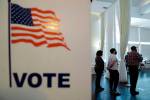Bush book slams Reid on Iraq and immigration
Former President George W. Bush apparently didn't think too long, or too highly, about Senate Majority Leader Harry Reid when he was writing the book on his presidency.
Reid, who as a Democratic leader was a big Bush critic on most issues, is mentioned just a handful of times in Bush's just-released 481-page biography “Decision Points.” The Nevadan appears mostly to be one of a cast of players as Bush pondered bank bailouts, the Patriot Act and going to war with Iraq.
Where Bush does focus on Reid - on immigration reform and the Iraq war surge - the image drawn is unflattering.
Jon Summers, communications director for Reid, said the former president was rewriting history in an attempt to “dress up” a presidency that most Americans view as “largely responsible for the challenges our country faces today.”
Here's what Bush had to say on page 382 about Reid on the Iraq surge strategy:
“After a day of heavy violence in April, Senator Harry Reid of Nevada declared, “The war is lost, the surge is not accomplishing anything.” The majority leader had just used his platform to tell 145,000 American troops and their families that they were fighting for a lost cause. He had written off the surge as a failure before all of the additional troops had even arrived. It was one of the most irresponsible acts I witnessed in my eight years in Washington.”
Reid made the war-is-lost comment at a press conference on April 19, 2007. Senate Democrats had been working on a bill to gradually withdraw from Iraq, which Bush threatened - and eventually vetoed.
Reid explained a day later on the Senate floor that he believed the United States needed to change course in Iraq from a strictly military operation to one that focused more heavily on diplomacy and economic assistance.
“The only way to succeed lies through a comprehensive political, diplomatic and economic strategy - so says the commander on the ground there General (David) Petraeus. Unfortunately, the only one to whom this is not obvious is the president,” Reid said.
Bush went on to write that he vetoed efforts to tie war funding to a withdrawal deadline, and ended up getting his way with the support of House and Senate Republicans.
Reid had to answer for the "war is lost" comment several times during his just-concluded Senate re-election campaign. Summers said that Reid was simply agreeing with Petraeus and emphasizing the need for a broader approach than simply flexing military might.
Reid through Summers fired his own salvo back at Bush, saying that Bush's “continuing refusal to acknowledge the tremendous cost - in service members' lives, national resources, and global leadership - of leading this nation into war on false justifications and refusing for the war's first four-and-a-half years to reassess a failed strategy is irresponsible and selfish.”
On immigration reform, Bush blamed Reid for failing to seize the moment when bipartisan reform was most likely to pass.
Shortly after the 2006 elections, Bush approached Sen. Ted Kennedy with a proposal to work together - as they had on education reform - to forge a bipartisan solution to immigration.
Kennedy turned to the two Arizona Republican senators - John McCain and Jon Kyl - to try to produce a bill that would secure the border, provide a temporary worker program and set up a tough but fair path to citizenship for law-abiding immigrants who had been in America for a number of years.
“Passions ran high on both sides of the issue,” Bush said, and had reached a frenzy when a deal seemed at hand.
In late June 2007, Kennedy asked Bush for assistance in getting him a few more days to get a bill passed. Kennedy wanted him to reach out to Reid and request that he delay the Fourth of July recess a few days for the negotiations to proceed.
On page 305, here is Bush's take on the immigration reform defeat:
“Given the importance of the legislation, I thought it would be worthwhile to allow them a little extra time for the bill to pass. Apparently, Harry Reid did not.
I made the pitch, but it was too late. Harry had made his decision. He called a cloture vote, which failed, and then adjourned the Senate. Senators went home and listened to angry constituents stirred up by the loud voices on radio and TV. By the time they came back to Washington, immigration reform was dead.”
The Senate on June 28, 2007 fell 14 votes shy of the 60 needed to advance the immigration reform legislation that President Bush backed.
At the time, Bush said he was disappointed that Congress failed to approve the bill but did not lay the blame at anyone's feet. The New York Times, Associated Press and Reuters noted that Bush had failed to gain support from Senate Republicans.
“Mr. Bush placed telephone calls to lawmakers throughout the morning, but members of his party abandoned him in droves, with only 12 of the 49 Senate Republicans sticking by him on the key procedural vote that determined the bill's fate,” the Times reported.
Reid also blamed the failure on Republicans, saying “there just was not enough Republican support for the president's approach.”
On the Senate floor, Reid forcefully argued for Congress to act on immigration reform and blamed radio and television commentators for ginning up public opposition to the bill.
Summers added that Reid had devoted more floor time to addressing illegal immigration than ever before.

















